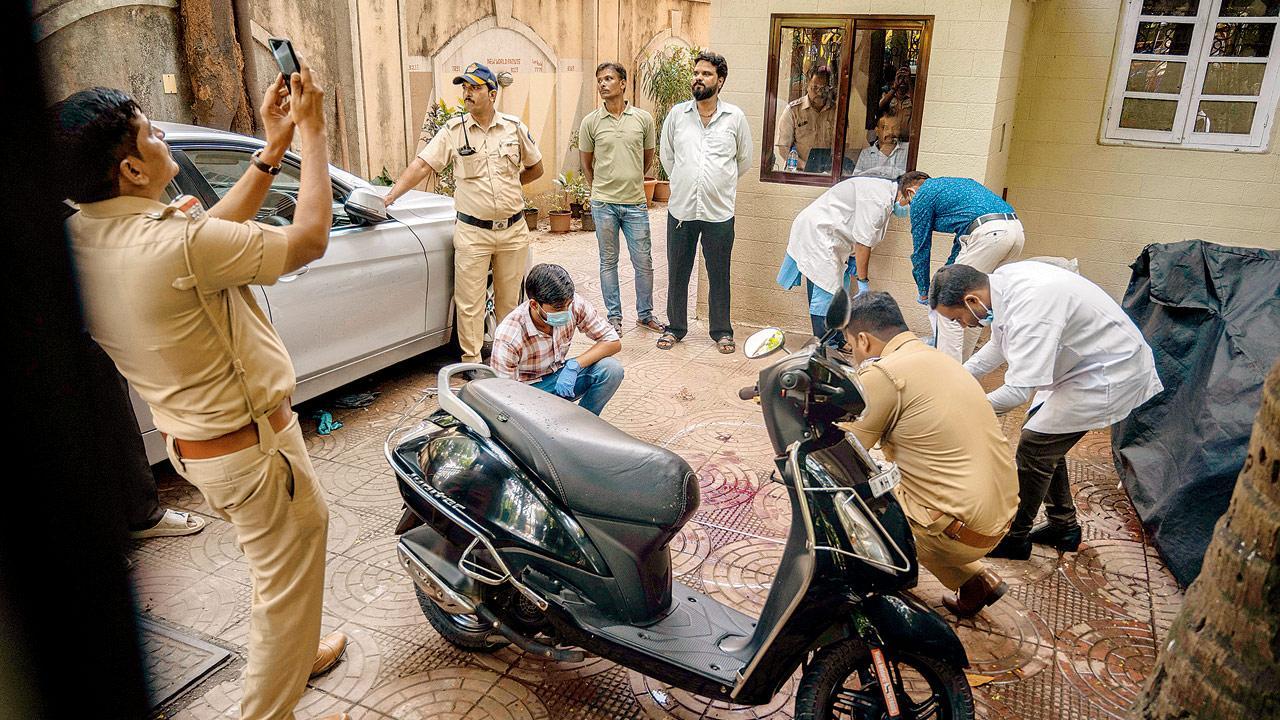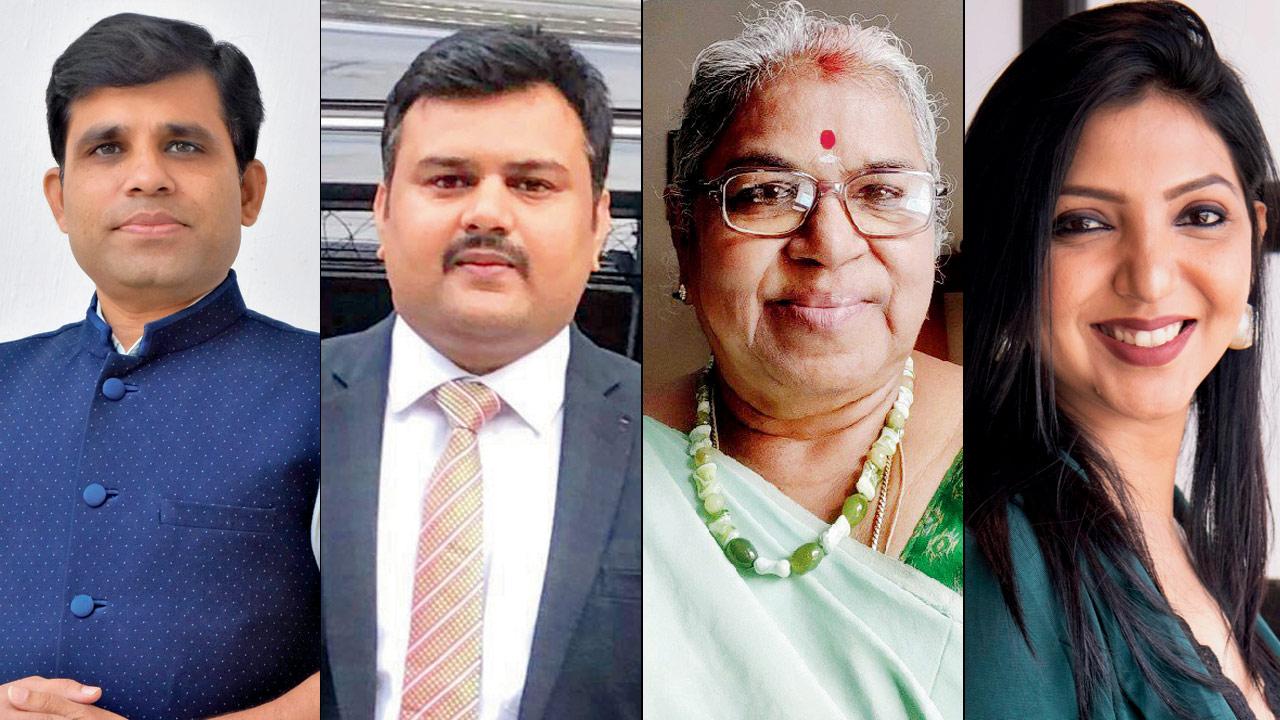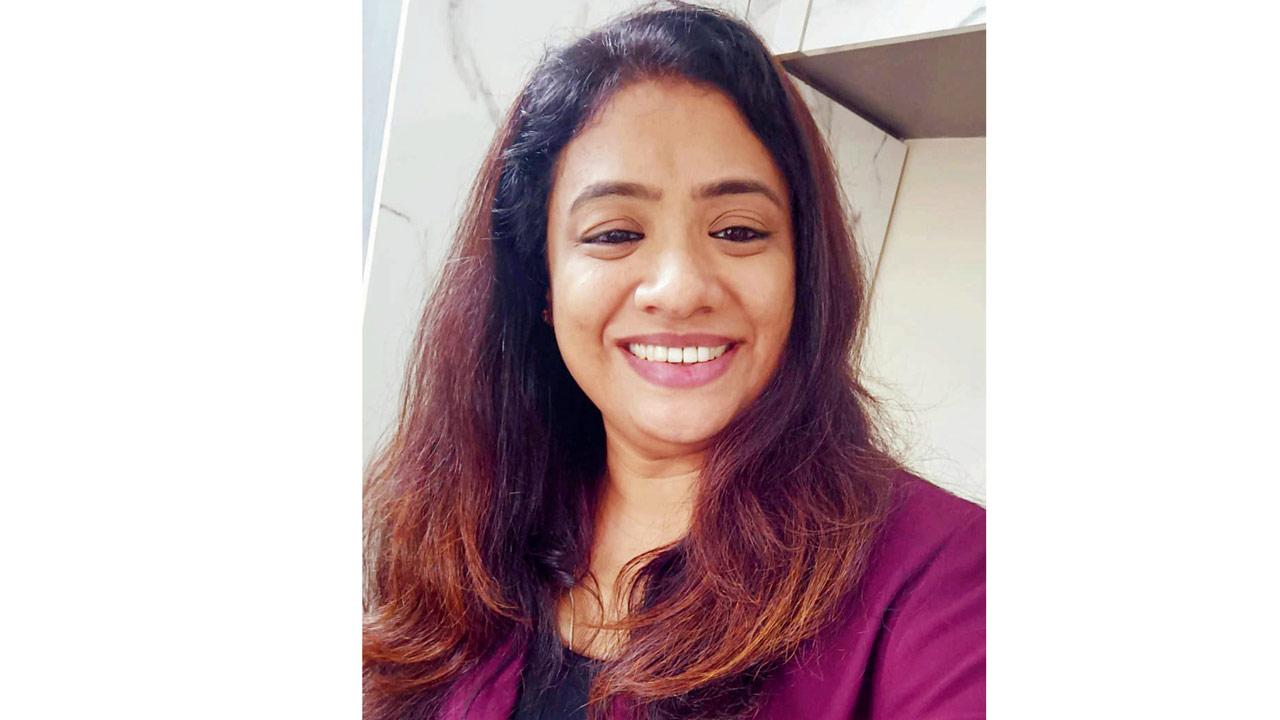Experts warn of a serious threat to the justice system, as private forensic labs mushroom across the country and operate unchecked

Mumbai police and forensic experts investigate the death of actor Malaika Arora’s father Anil Arora, who fell off the terrace at his Bandra home on September 11. Pic/Getty Images
Even as the government pushes for forensic investigation to play a greater role in the criminal justice system with the Bharatiya Nagarik Suraksha Sanhita (BNSS), the country is woefully unprepared for the wave of cases that will soon hit forensic laboratories, warn experts.
The most glaring oversight is the lack of a central regulatory body to set guidelines for operations of forensic laboratories, and to enforce these regulations by mandating registration, accreditation and regular audits of these labs and self proclaimed forensic experts, heading/ working in such laboratories. Currently, anyone can claim to be a forensic expert in India, armed only with dubious online or diploma certifications in forensic science or related disciplines.
With no regulatory body, there is no Standard Operating Procedure (SOP) to follow, nor anyway to monitor standards of testing / equipments and the integrity of evidence. This is especially concerning in light of private forensic laboratories mushrooming across the country, raising the risk of inconsistent and unreliable evidence in courtrooms across India.

(Left to right) Dr Indrajit Khandekar, Amol Deshmukh, Dr Rukmani Krishnamurthy and Advocate Mohini Priya
In Clause (3) of Section 176 of the BNSS, which has replaced the Code of Criminal Procedure, forensic testing has now become mandatory for every offences that carry sentences of more than seven years. Under the CrPC, it was left up to the police to decide whether forensic experts (autopsy surgeon and forensic team from FSL) would need to be called in for crime scene investigation of a case or not. This change in the criminal investigation code will only increase the workload on already overburdened State run labs, where forensic analysis in thousands of cases are still pending, says Nisha Menon, forensic expert and consultant.
“On one hand, there is a significant shortage of government-run forensic laboratories and experts to handle the analysis of evidence seized during the course of police investigation. On the other hand, the number of high-tech and planned crimes in India is increasing,” said Menon.
Seeing an opportunity in the demand-supply gap, private forensic laboratories have proliferated. While other countries have mandated accreditation for laboratories that perform forensic tests for legal purposes, private labs in India are not accredited and often lack standardisation and quality control measures. “Many of these private labs are operated and funded by non-experts or retired experts with specialisation in only one subject. They submit reports across several forensic disciplines which are not their domain of expertise. Additionally, these labs hire either inexperienced freshers or employees who merely hold online certifications or short diplomas in related disciplines,” said Menon.
It has also come to light that today anyone with mere certification or diploma course in forensic, tag themselves as forensic experts, a trend which is gradually becoming popular since crime thrillers on cable TV and OTT platforms, are turning out to be most watched programs. It is, therefore imperative to have a regulatory body, to keep tap of such mushrooming 'quacks', who set up their private laboratories, with no required qualification or on the job training. And if this is continue, it will not only derail the criminal justice system, but also adversely undermine the usage of forensic science, in its true sense.
 Nisha Menon
Nisha Menon
Unqualified personnel handling sensitive forensic samples may lead to contamination, mishandling, or biased analyses and reports. “This unregulated growth [of private forensic labs] poses a significant risk to the integrity of forensic evidence and the criminal justice system as a whole. The consequences of flawed forensic analysis can be devastating, leading to wrongful convictions, miscarriages of justice, and harm to innocent individuals,” warned Menon.
Lack of regulation
A regulatory body and accreditation process is the need of the hour, stressed Menon. The problem lies not in private laboratories opening, but in the utter lack of regulation. Rukmani Krishnamurthy, former Director of the Directorate of Forensics Science Laboratories, Maharashtra, who is also academic council member of National Forensic Science University (NFSU) in Gujarat, said, “The demand for forensic investigation is rapidly increasing. It is also a fact that under-staffed and overburdened government-run forensic laboratories cannot solely meet the requirement. Hence, the role of private forensic laboratories has become crucial.”
She proposes that “a national forensic council be formed under the ambit of NFSU that would not only mandate registration of private forensic science laboratories but also accredit them, conduct regular checks on their team’s qualifications, expertise and equipment, so as to ensure that the quality of analysis is not compromised and can stand court trials without an iota of doubt”.
Botched forensic investigation has led to several high-profile cases failing to hold up in court, as pointed out by Mohini Priya, Advocate on Record, Supreme Court of India. “Contradictory reports by the Mumbai FSL and a foreign private laboratory in the investigation of actress Jiah Khan’s death in 2013 had cast doubts on the reliability of forensic evidence [in India],” she said.
She also flagged the 2012 Nirbhaya gang rape case, which was the first in India to use forensic odontology to match the convicts’ teeth to bite marks on the victim. However, due to a dearth of such experts in India, the case was delayed. In another high-profile investigation in the 2008 Aarushi Talwar murder case, it was widely reported that the crime scene had been contaminated and evidence such as Aarushi’s personal belongings and potential DNA samples were mishandled, besides which the autopsy report also contained discrepancies. “These cases have highlighted the profound impact that forensic mishandling can have on the pursuit of justice,” said Advocate Mohini.
“It is crucial to establish clear legal guidelines and standards for the admissibility of forensic evidence. This involves mandating the accreditation of forensic laboratories to ensure they meet high quality and reliability standards. Legislative amendments are necessary to enforce these standards rigorously, defining specific consequences for non-compliance,” said Advocate Mohini.
The lack of oversight of Indian laboratories means criminal defendants can simply hire the services of a private lab to provide a contradictory report and undermine the prosecution’s case. Amol Deshmukh, senior faculty member at the government-run Institution of Forensic Science, Mumbai, recalled one such incident: “In one case, a private laboratory in Mumbai claimed to have detected alcohol in dried blood stains [it is scientifically not possible to detect alcohol in blood samples older than 24 hours], contradicting the FSL report and, therefore, undermining the credibility of forensic science. Instances abound of conflicting DNA reports from hair samples, all obtained at exorbitant prices dictated by client pressures.”
Deshmukh pointed out another disturbing instance wherein his timely intervention averted a numerologists and a graphologists(in another case), from issuing their expert view in a forensic case pertaining to handwriting and signature analysis, despite no actual qualification and expertise in forensic science. It has also come to light that today anyone with mere certification or diploma course in forensic, tag themselves as forensic experts, a trend which is gradually becoming popular since crime thrillers on cable TV and OTT platforms, are turning out to be most watched programs. It is, therefore imperative to have a regulatory body, to keep tap of such mushrooming 'quacks', who set up their private laboratories, with no required qualification or on the job training. And if this is continue, it will not only derail the criminal justice system, but also adversely undermine the usage of forensic science, in its true sense.
Forensic and landmark cases
“In landmark cases such as ‘Solanki Chimanbhai Ukabhai v. State of Gujarat’, the Supreme Court of India has established that while forensic evidence is corroborative, its value can be overshadowed by reliable eyewitness testimony. The Court underscored that inconsistencies between forensic reports and eyewitness accounts do not automatically discredit the eyewitnesses if their testimony is deemed credible and satisfactory. This nuanced approach reflects the complexity of integrating forensic evidence into the legal framework and the necessity for careful evaluation of all evidence presented, said Advocate Mohini.
She continued, “The Supreme Court’s observation in ‘State of Haryana vs. Bhagirath’ further stresses the need for a progressive approach towards the acceptance of expert testimony, emphasizing that advancements in science should inform legal standards, provided the evidence meets established reliability criteria. Despite this, the application of forensic science in India is fraught with challenges that hinder its effectiveness and reliability.”
Failed attempts
The Ministry of Home Affairs (MHA) and National Human Rights Commission had attempted to address these issues with the issuance of Standard Operating Procedures (SOPs) in 2020 for proper evidence collection and processing, particularly in cases of sexual assault. However, lapses in forensic probe of cases like the 2020 Hathras gang rape [in which there was a delay in recording the victim’s statement and her medical examination] indicate that these guidelines have not been uniformly applied, particularly in rural and suburban regions.
In 2011, the government had also drafted the Forensic Regulatory & Development Authority Of India (FRDA) Bill in lines of TRAI (for telecom industry), IRDA (Insurance Regulatory and Development Authority- for insurance industry). But the Bill never saw the light of day said Dr Indrajit Khandekar, Professor of Forensic Medicine and Toxicology, Mahatma Gandhi Institute of Medical Sciences, Sevagram.****
“The aim of this bill was to establish a forensic sciences regulatory authority, who would have monitored the functioning of both the State/Central Forensic Laboratories incuding private Laboratories and also have common Standard Operating Procedures (SOPs) for all laboratories. However, it was kept in cold storage for unknown reasons,” he said.
Forensic experts in the know said, “The bill was a detailed report highlighting a 50-year plan for forensic science laboratories across India. It had recommended having a regulatory body for private laboratories. Two noted forensic experts Dr Gopalji Mishra, former Director FSL, Punjab and Dr C Damodaran, former Director FSL Tamilnadu,had submitted a over 500 pages on Perspective Plan for Indian Forensics. ”
 Subscribe today by clicking the link and stay updated with the latest news!" Click here!
Subscribe today by clicking the link and stay updated with the latest news!" Click here!








